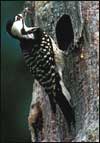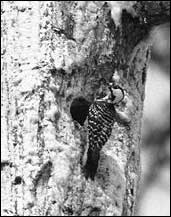Red-cockaded Woodpecker
How Can We Bring Them Back?

Red-cockaded Woodpecker
Many private landowners view their forests, or the pine timber on their land, as money in the bank. They look at the investment of time and money, and fear that an endangered species such as the RCW will show up on their land and essentially devalue their investment. In Texas, RCW recovery is designated on Federal lands owned and managed by the U.S. Forest Service. In reality, RCW recovery in Texas will depend upon assistance from the private landowners adjacent to these forests since the current ownership is essentially arranged in a checkerboard pattern. This fact worries most private landowners with timber near the National Forests in Texas.

Red-cockaded Woodpecker
Photo by R.N. Conner, USFS
That is why state and federal authorities recently developed a plan to give these private landowners “peace of mind.” This Plan is known as the Regional Habitat Conservation Plan (hereafter, the Plan) for the RCW on Private Lands in the East Texas Pineywoods. Essentially, private landowners who sign up under the Plan are protected from future RCW occupation of their land in return for growing large sawtimber in East Texas utilizing established forest management practices such as thinning, prescribed burning and selective harvesting. These practices increase the value of the timber while giving the RCW a temporary place to live. This will benefit recovery efforts on federal lands because the net result will be more woodpeckers to inhabit the managed RCW habitat on Forest Service lands.
The landowner will also benefit from knowing that their timber investment is protected. This protection should result in larger and older trees across the landscape which should be worth more money when harvested. Through cooperative efforts such as the Plan and restoration efforts on Texas National Forests, the future of this resilient bird is looking bright.
For more information on this Plan, please contact:
- Texas Parks and Wildlife Department (TPWD) in Nacogdoches at (936) 564-0234,
- US Fish and Wildlife Service (USFWS) in Lufkin at (936) 639-8546,
- Texas Forest Service (TFS) in Lufkin at (936) 639-8180.
Wildlife Diversity Program
Texas Parks and Wildlife Department
4200 Smith School Road
Austin, TX 78744
or send a message to: nature@tpwd.state.tx.us